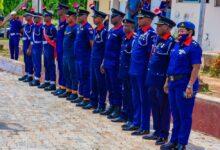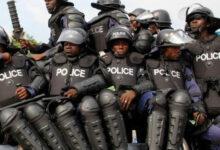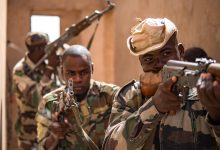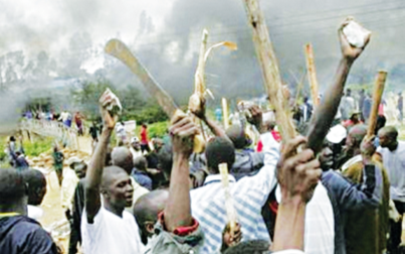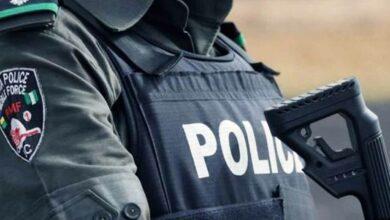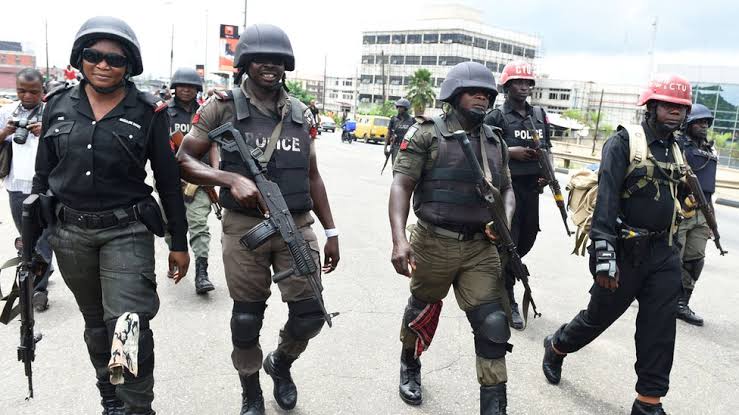
Top 15 Elite Paramilitary Units in Nigeria
Top 15 Elite Paramilitary Units in Nigeria: Nigeria is home to several elite paramilitary units that play crucial roles in maintaining law and order, national security, and conducting special operations. These units are highly trained and well-equipped to handle high-risk situations, gather intelligence, carry out covert operations, provide VIP protection, and support the military and police when needed.
The origins of many of these units can be traced back to the colonial era when the British established various specialized forces to protect their interests in Nigeria. After independence in 1960, the Nigerian government continued to develop and expand on these paramilitary units to address the country’s unique security needs.
👉 Relocate to Canada Today!
Live, Study and Work in Canada. No Payment is Required! Hurry Now click here to Apply >> Immigrate to CanadaThis article will provide an overview of the top 15 elite paramilitary units in Nigeria, looking at their history, roles, capabilities, training, and areas of deployment. The units covered include the Department of State Services, National Intelligence Agency, Defence Intelligence Agency, Nigerian Security and Civil Defence Corps, Police Mobile Force, Counter Terrorism Unit, Special Protection Unit, Special Anti-Robbery Squad, Rapid Response Squad, Special Tactical Squad, Explosive Ordinance Disposal Unit, National Drug Law Enforcement Agency, Nigeria Customs Service Strike Force, Nigeria Immigration Service Special Force, and Nigerian Prisons Service Close Protection Unit.Top 15 Elite Paramilitary Units in Nigeria
Read Also: Top 15 Natural Healing Secrets in Nigeria
Top Elite Paramilitary Units in Nigeria
1. Department of State Services (DSS)
The DSS is Nigeria’s primary domestic intelligence agency. It was established in 1986 to gather domestic intelligence, provide security for senior government officials, and counter domestic threats. Headquartered in Abuja with state and local command centers nationwide, the DSS has broad powers of arrest and detention. Agents undergo rigorous training modeled after the FBI and Mossad. The DSS plays a lead role in counterterrorism and counterintelligence operations.Information Guide Nigeria
2. National Intelligence Agency (NIA)
The NIA serves as Nigeria’s foreign intelligence service. Formed in 1986, its mandate includes intelligence gathering on strategic threats beyond Nigeria’s borders, counterintelligence, and conducting covert operations. With training from the CIA, NIA operatives undertake specialized functions like signals intelligence, communications interception, cryptology, and counter-proliferation. The agency employs sophisticated surveillance equipment for its operations targeted at foreign threatsRomantic Love Messages
3. Defence Intelligence Agency (DIA)
The DIA is the intelligence arm of the Nigerian military, focused on defense intelligence. The agency was established in 1986 to gather military-related intelligence and provide tactical, operational, and strategic defense intelligence. DIA operatives are embedded with all branches of the armed forces. Their expertise is crucial for conducting effective military operations and providing early warnings on external threats. The DIA also plays a key role in Nigeria’s contributions to international peacekeeping missions.
4. Nigerian Security and Civil Defence Corps (NSCDC)
The NSCDC is a paramilitary agency set up to protect lives and critical national assets. The corps has over 100,000 personnel deployed in all 36 Nigerian states. NSCDC officers safeguard pipelines, airports, seaports, railways, and other key locations. They also provide security at major events. The NSCDC has a dedicated anti-vandalism task force and an intelligence department. Officers undergo basic paramilitary training, intelligence courses, and other specialized training to handle issues like terrorism, cybercrime, pipeline vandalism, and disaster response.105 Good Morning Love Message
Read Also: Top 13 Phones Below 15k in Nigeria
5. Police Mobile Force (MOPOL)
MOPOL is the elite rapid response unit of the Nigerian police force. It was formed in 1957 when Nigeria was still a British colony. MOPOL commandos are specially trained in weapons handling, riot control, SWAT tactics, VIP protection, counterinsurgency, and counterterrorism. They are deployed when standard policing is inadequate. MOPOL squadrons have intervened in high-risk crimes, riots, ethnic/religious clashes, and extremist attacks. Their training and capabilities are similar to many SWAT teams worldwide. When deployed, they utilize sophisticated tactical equipment and weapons.NYSC Portal
👉 Relocate to Canada Today!
Live, Study and Work in Canada. No Payment is Required! Hurry Now click here to Apply >> Immigrate to Canada6. Counter Terrorism Unit (CTU)
The CTU is the Nigerian police unit mandated for counterterrorism and counterinsurgency operations. Formed in 2009 in response to the growing Boko Haram threat, CTU operatives are specially selected from the police, military and other security agencies. The CTU leverages intelligence gathering, surveillance, community engagement and specialized tactics to preempt and disrupt terror activity. CTU officers undertake urban and jungle warfare training to undertake rescue, raids, ambushes and other dangerous operations. The unit has been credited for successfully foiling major terror plots.JAMB Portal
7. Special Protection Unit (SPU)
The SPU provides armed security and protective services to key public figures in Nigeria. Officials protected by the SPU include governors, senators, diplomats, senior civil servants, currency controllers, and chief executives of major firms. SPU operatives are trained in close quarters battle, defensive driving, first aid and other protective techniques. The SPU works closely with the police and DSS to analyze risks and emerging threats to their clients. SPU protection duties involve extensive mission planning and coordination.
Read Also: Top 15 Masterchefs in Nigeria
8. Special Anti-Robbery Squad (SARS)
SARS was a controversial Nigerian police unit focused on armed robbery, kidnapping and other violent crimes. It was dissolved in 2020 due to human rights concerns over excessive force. At its peak, SARS operatives undertook undercover operations, surveillance, raids and sting operations targeting suspected criminals. Despite its successes against dangerous gangs, SARS faced allegations of extrajudicial killings, torture and abuses, leading to nationwide #EndSARS protests until it was disbanded. Some functions of SARS have been assumed by the Special Tactical Squad.Court Steps in to Shield D’banj from Do2dtun’s Defamation
9. Rapid Response Squad (RRS)
The RRS is an elite police tactical unit based in Lagos State. The RRS consists of specially trained, heavily armed officers deployed to respond to emergencies and high-risk crimes in progress. RRS officers utilize helicopters, armored vehicles, mobile command centers and a sophisticated communication network for rapid mobilization. RRS units undertake operations against robbery, kidnapping, assassinations, ethnic clashes, pipeline vandalism and other public safety threats within Lagos. The RRS also provides VIP protection in Lagos.
10. Special Tactical Squad (STS)
After SARS was disbanded, the STS was created as a new elite tactical team under the Force Intelligence Bureau. Carefully selected officers undergo specialized training in intelligence gathering, surveillance, combat shooting, hostage rescue and other tactical capabilities. STS operatives deploy covertly for operations against violent criminals, gangs, kidnappers, cultists and insurgent groups. The STS coordinates with Interpol and foreign law enforcement agencies to contain transnational criminal threats.
Read Also: Top 15 Health Benefits of Local Apples in Nigeria
11. Explosive Ordinance Disposal Unit (EOD)
The EOD unit comprises specially trained Nigerian police bomb technicians tasked with explosives disposal and counter-IED operations. EOD personnel undergo months of training to handle unstable ordnance, dangerous chemicals, and complex detonators. The EOD responds to reports of suspicious packages, abandoned explosives and bomb threats. EOD teams wear specialized bomb suits and utilize advanced equipment like robots and x-ray systems to assess threats. The EOD works closely with first responders and military experts when responding to explosive emergencies.Barcelona president Joan Laporta charged with bribery
12. National Drug Law Enforcement Agency (NDLEA)
The NDLEA is Nigeria’s lead agency fighting drug trafficking and substance abuse. Formed in 1989, the NDLEA combats narcotic sales and use through raids, arrests, seizures and drug interdiction operations. Agency operatives work closely with international agencies like the DEA. NDLEA officers undergo extensive training in narcotics detection and surveillance methods. The NDLEA also deploys undercover agents and informant networks to infiltrate drug rings. Offensive action against drug cartels has intensified under current NDLEA head, Brigadier General Mohamed Buba Marwa.
13. Nigeria Customs Service Strike Force
The Strike Force is the paramilitary enforcement arm of the Nigeria Customs Service. The unit was set up to combat smuggling and enhance customs and excise control. Strike Force operatives are trained by the military, DSS, MOPOL, and other security agencies in weapons handling and anti-smuggling tactics. Using marked strike force vehicles and speedboats, the unit seizes contraband at airports, land borders, and maritime areas, sometimes in violent confrontations with smugglers. The Strike Force has made major seizures of arms, drugs and other prohibited imports.
14. Nigeria Immigration Service Special Force
The Immigration Special Force provides armed enforcement and border security. Also known as the Immigration Para-military, officers are trained in combat shooting, riot control, intelligence, border surveillance and immigration procedures. The Special Force tackes issues like human trafficking, transnational organized crime, and terrorism at border crossings, airports, and other ports of entry. Special Force operatives conduct raids to disrupt criminal networks exploiting borders to perpetrate crimes in Nigeria and beyond.
Read Also: Top 15 Forbidden Paintings in the World
15. Nigerian Prisons Service Close Protection Unit
This specialized unit provides maximum security escort and safe custody for high profile inmates like convicted terrorists and kidnappers. The Close Protection officers are armed with assault rifles and trained to anticipate and foil escape attempts, hostage situations and external attacks to free inmates. The unit keeps a watchful eye 24/7 and is trained to employ lethal force if necessary to maintain custody of dangerous persons facing capital charges and severe sentences.
Conclusion
Nigeria’s elite paramilitary units have evolved over decades to tackle specialized challenges like insurgency, militancy, terrorism, trafficking and organized crime. Units like the DSS, NIA, DIA, MOPOL, CTU and NDLEA have built substantial tactical capabilities and expertise in intelligence gathering, counterterrorism, VIP protection, border security and narcotics control through specialized recruitment, intensive training, and advanced equipment. These units will continue playing decisive roles in maintaining peace and stability as Nigeria contends with serious national security threats both within and beyond its borders. Their peak responsiveness, covert capabilities and interagency cooperation make them invaluable assets in safeguarding Nigeria’s strategic interests.
Check JAMB RESULT
Check and Confirm: How much is Dollar to Naira
